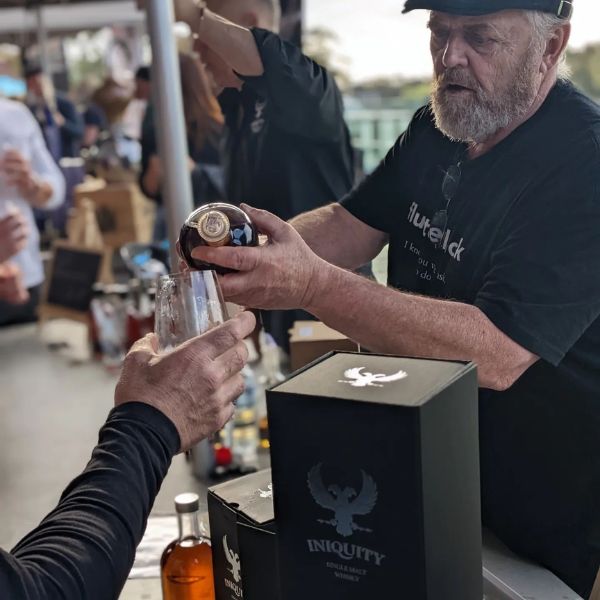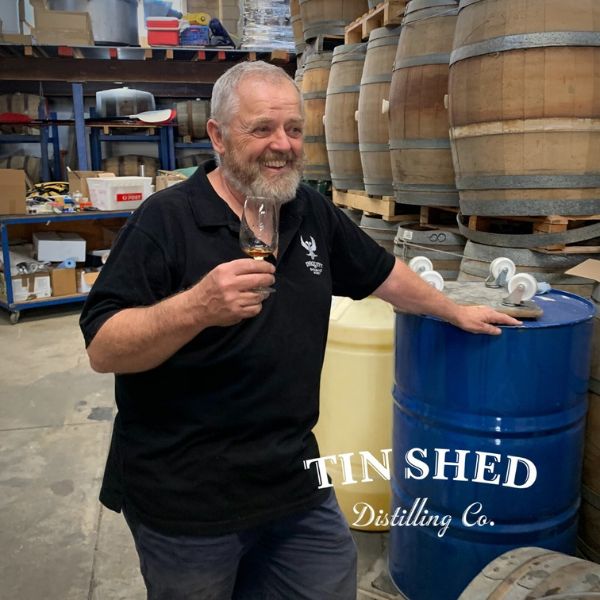
10/07/2023 As a veteran distiller, Ian Schmidt is one of the founders of Iniquity - a journey that grew from a passion for distilling passed down from his forefathers.
For Ian, it's all about the unique experience you get with every drop of the dram. He loves to experiment with regional flavours from South Australia. We chat with him about his role as a distiller, what his day looks like, and some tips from him on how distillers can help grow the business.
Tell us a little about your background and journey into distilling
For 36 years I built and installed flagpoles. My Business partner, Vic Orlow was a postman for 27 years and a chef before that. About 22 years ago we were leaning on the school fence waiting to pick up our respective kids when Vic announced he was going to buy a small still and make some vodka. Vic's parents were Cossacks from the old USSR and had migrated to Australia after WWII and Vic had a fondness for vodka. I told Vic to save his money as I had a small still I had inherited from my grandfather. That is where it all started and we received a license to produce back in 2004, which made us one of the very first mainland distillers of the modern era of Australian distilling.

Your current role and what does your day look like?
We are a lean and green operation. There are still just the two of us as full-time employees and we do almost everything ourselves and in-house. Production is totally in-house, from mashing to bottling and shipping. Marketing and back-office staff are outsourced, although we both play an active part in these tasks too. My role has gravitated toward management and marketing. Vic's role is more toward production, but we both do a bit of both and we are both involved in problem-solving. We have our fair share of those!
What inspired you to become a distiller?
Fun, the customers, rum, and whisky. You work hard as a flagpole maker to build a customer relationship, you sell a pole and never see the customer again because the product lasts a lifetime. If you build the same relationship with a spirit drinker they keep coming back and become friends for life.
What are some of the most important skills for a distiller?
Vision, dreams, first principal logic, problem-solving, a good sense of smell and taste, and lastly, patience and confidence in your abilities.
How do you think a distiller can help in driving marketing and sales personally?
Marketing and sales personality boils down to good storytelling. Getting out to tell the stories is the best way, whether in person or virtually.
[[relatedPurchasesItems-31]]
Define a good distiller
A good distiller knows what he is doing and what he is trying to achieve. A good distiller knows his equipment inside out. A good distiller is alert and observant, if things go pear-shaped it can very quickly become very expensive and very dangerous.
What is the hardest part of a distiller's job?
Cleaning and mashing and distilling on 40C days
What's your elevator pitch to a bartender when pitching your brand
Don't just take my word for it, taste it for yourself.
What are the current challenges the spirits industry is facing according to you?
The Australian tax regime for alcohol discriminates against spirits.
What skill or topic you are learning currently and why?
Sustainability, because we all have a shared responsibility to do the right thing for the planet, plus it makes good sense from an operational and commercial perspective.

What is your idea of a good life?
A good boat, fair winds, flat seas, and a rum in hand.
Which is your go-to drink and what is the perfect setting you enjoy it in?
"The Ferret" Requiem Rum, on a good boat with fair winds and flat seas
Your favourite 2-3 distilling or spirits books?
Whiskey, Brandy & Cordials by Irving Hirsch
The Maturation of Distilled Spirits by Hubert Germain-Robin



